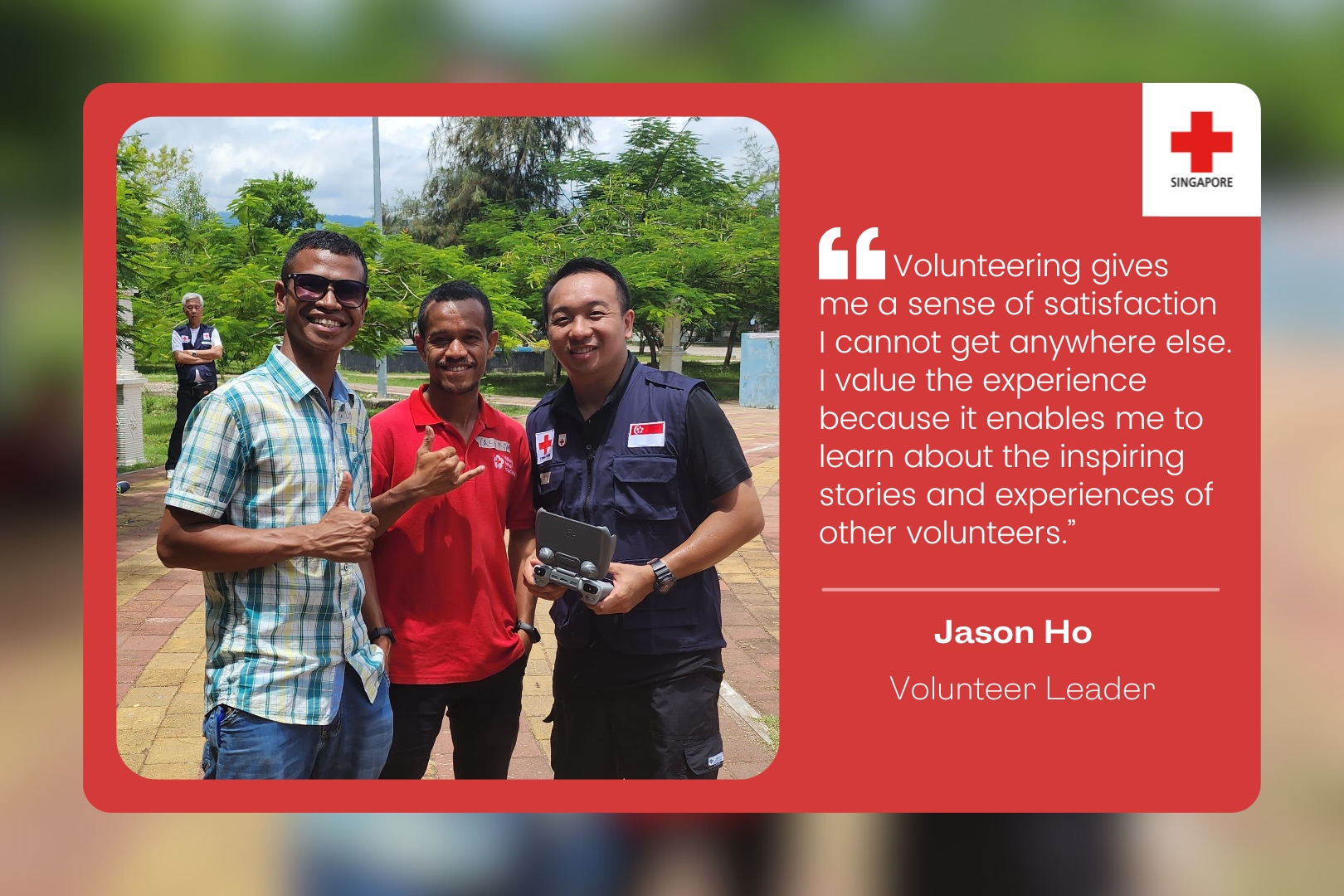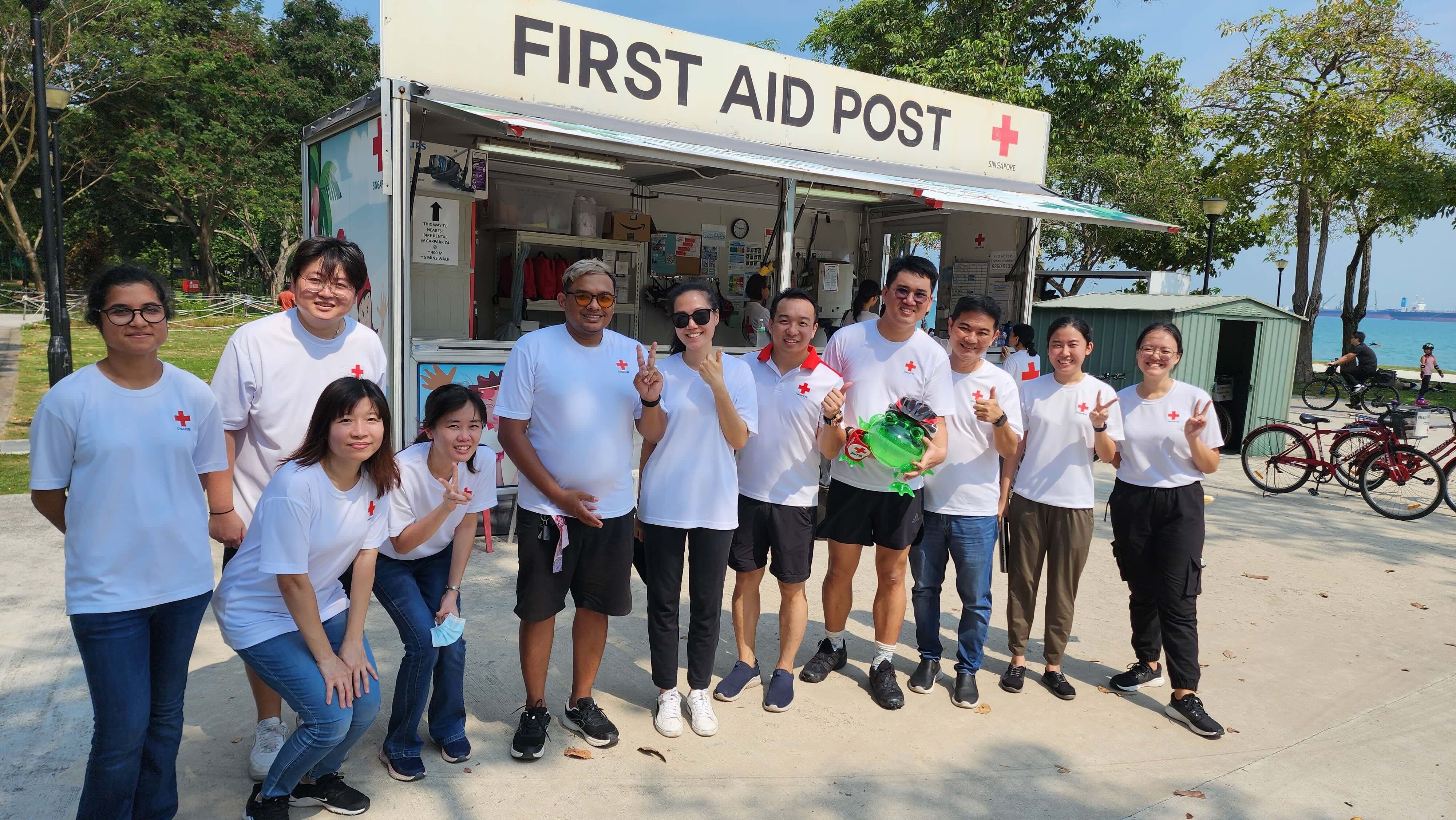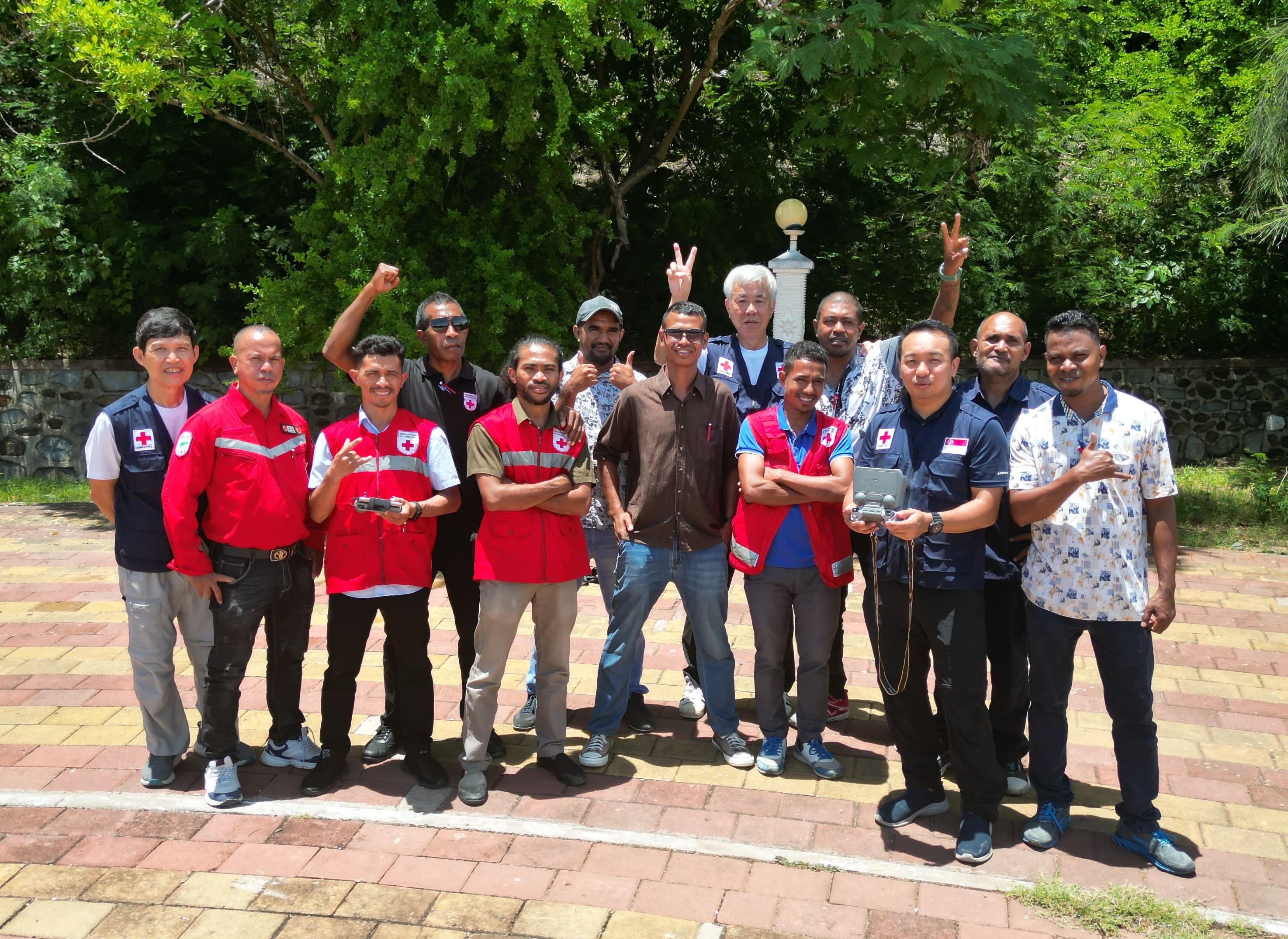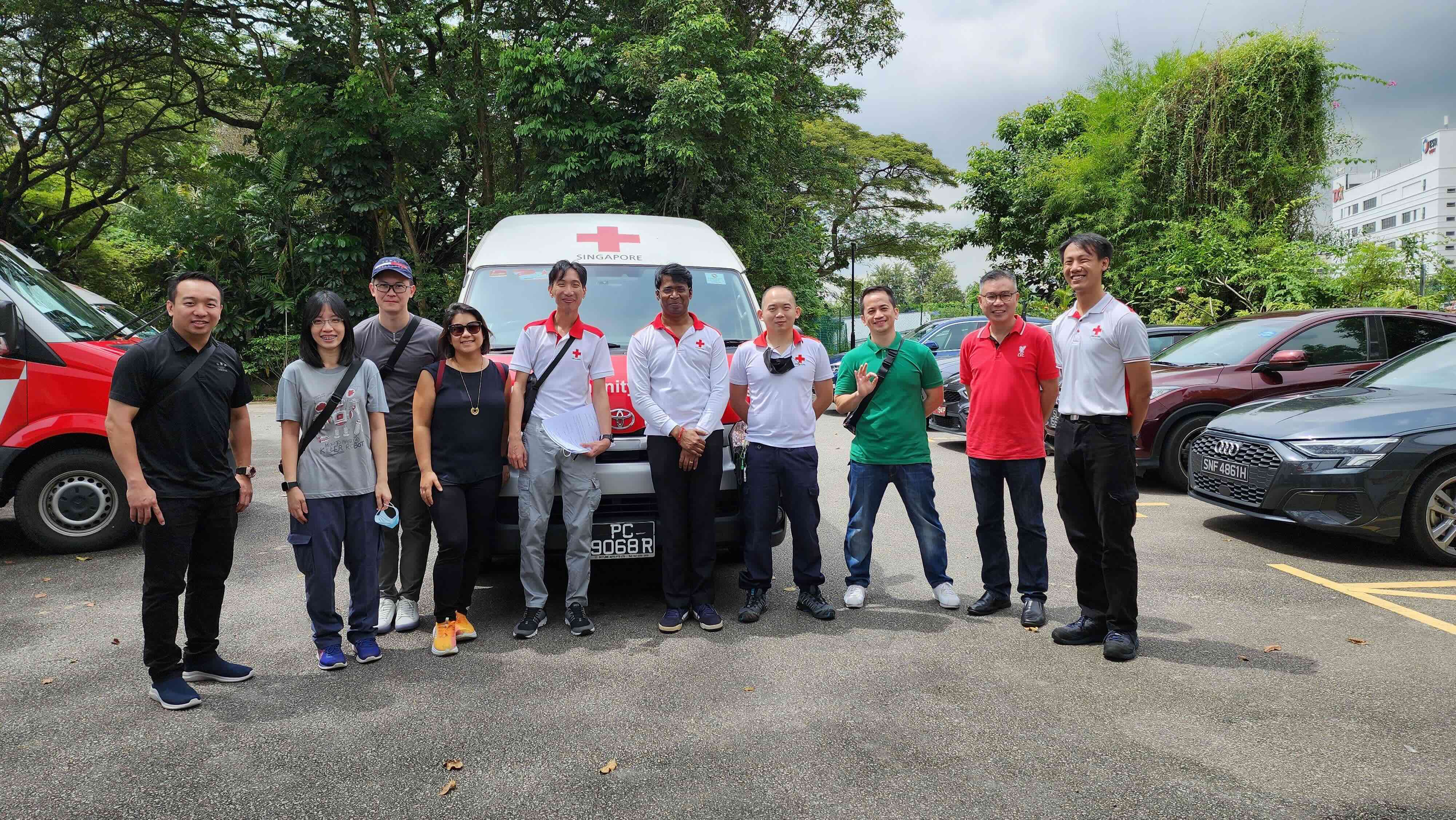
When the Singapore Red Cross’ (SRC) Global Engagement (GE) division explored the possibility of mobilising drones for its disaster and rescue operations in 2019, it was scouting for someone to train people to operate the drones. A former GE employee learnt that one of SRC's long-time volunteers, Ho Kee Teck, also known as Jason, could step up to that challenge. Jason, a former Red Cross Youth Link in primary school, had resumed volunteering with SRC as a First Aider on Wheels. Jason shares his experience training volunteers in drone operations locally and internationally, establishing the Drivers Training Workgroup, and becoming a Volunteer Leader.
When the Singapore Red Cross’ (SRC) Global Engagement (GE) division toyed with the notion of deploying drones for its disaster rescue and relief operations in 2019, it realised it would need someone to train a group of people who would be able to operate the machines.
As luck would have it, they did not have to look very far. A former GE employee found out that one of SRC’s long-time volunteers might be the person they were looking for. His name was Ho Kee Teck, also known as Jason.
Jason, 38, started volunteering as a Red Cross Youth Link at Pei Tong Primary School in the mid-1990s. When he was 27, he resumed volunteering with SRC’s First Aiders On Wheels programme, as part of the People’s Association’s Community Emergency Response Team (CERT).

Jason and fellow First Aiders on Wheels at the SRC First Aid Post at East Coast Park.
Developing the Training Framework for Drone Operations
Apart from the SRC and his day job as an Events Director, Jason also flew drones and was a certified Commercial Drone Operator with the Civil Aviation Authority of Singapore. He also conducted interest group training and consultation work for private organisations. It did not take long before he was roped in to realise the GE division’s plans.
But it was not going to be easy.
“Not only would it be the first course on drone operation conducted by the SRC, it would also be the first drone with surveillance operations in Singapore," said Jason.
There was also ambiguity about the direction the training framework should take.
"CAAS was the authority that conducted the tests for the operators to pass their test requirements. There was no theory and no training school then," Jason said.
But he was not deterred. Together with the support of the SRC’s GE team, Jason established a drone workgroup for GE comprising a dedicated ensemble of drone specialists and trainers.
The Drone Workgroup developed the training programme for drone operations during the day and night.
"We commenced the training programme for drone pilots in 2020 with the objective of not merely teaching but also providing support for the graduates. The rigorous training consisted of 10 to 12 two-hour sessions spanning three to four months," he said.
The pandemic put a halt to the course on several occasions, and some participants dropped out. With the easing of Covid-19 restrictions, the course resumed towards the end of 2021. In June 2022, the first batch of SRC’s drone specialists graduated.
"I plan to train a new group of drone specialists in Singapore in early 2024 as part of a regular capacity-building programme for the GE division," he said.
Bringing drone capabilities overseas
Drone training was not going to be isolated to Singapore, however. At the Better Together Dialogue that SRC organised, it announced its initiative to provide training on drone operations to the Red Cross and Red Crescent National Societies in Southeast Asia to bolster their capabilities.
In March 2023, Jason and two of his graduates conducted a Drone Operation Training Programme for the Timor-Leste Red Cross. He hopes to provide similar training to other Red Cross and Red Crescent National Societies elsewhere in the region of Southeast Asia.

Jason and teammates with their counterparts from the Timor-Leste Red Cross.
Formalising the Drivers Training Workgroup
Apart from focusing on training local and international communities in drone operations, Jason also formalised the Drivers Training Workgroup.
During a conversation with Community Services (CS) department employees several years ago, Jason learnt that SRC previously had volunteer drivers.
"I proposed re-introducing the Volunteer Drivers Programme for volunteers to drive during weekends, mitigating the workload of the SRC drivers. Based on my experience as an ambulance driver and an orientation trainer for new drivers during my National Service days, I was recruited to train volunteer drivers for the Southwest Red Cross Club, where I was the vice-chair for Transport Aid and the chairman of the Jurong District," he said.
Today, Jason provides Train-the-Trainer and Train-the-Volunteer Driver Programmes. He ensures these orientations are consistent, high-quality performance.
"Drivers who have completed the in-depth orientation are added to SRC’s Drivers Workgroup, where they will be deployed upon request from various SRC departments. Within the trainer workgroup, we plan bonding activities for the volunteer drivers, augment our processes based on feedback, and conduct refresher courses," Jason said.

Jason with fellow volunteers who are part of the Volunteer Drivers Programme.
Becoming a Volunteer Leader
Jason's proactiveness, initiative and tireless contributions spoke volumes about his commitment to volunteering.
In 2023, he was invited to attend the SRC Volunteer Leadership Programme (VLP), a four-day course conducted over weekends to develop volunteer leaders.
Typically, the Volunteer Management team asks SRC’s departments annually to submit names of volunteers, who they feel can be volunteer leaders.
“I was keen to become a Volunteer Leader, to equip myself with leadership skills while embracing the right mindset. The VLP was enriching as it provided insights, objectives, and information that shape future leaders," Jason said.
The programme enabled him to meet other Volunteer Leaders and gain insights from their experience. It bridged connections among leaders from various SRC departments, bolstering multiple volunteer programmes.
Jason feels that being a Volunteer Leader is similar to being a regular volunteer because the essence of the work is volunteering. Yet, being a Volunteer Leader entails a greater responsibility.
"As a Volunteer Leader, there is a heightened commitment, and sense of responsibility to lead the programmes I have developed for SRC while recruiting, engaging, and motivating to sustain the volunteers," Jason said.
The skills he acquired from the VLP were not limited to his work with the SRC.
"After attending the VLP, I developed greater self-awareness, the ability to recognise and understand how I am feeling and thinking, and how my emotions may impact the behaviour of others," Jason said.
Encouraging Others to Volunteer or Become a Volunteer Leader
Jason encourages people considering volunteering to take the first step to volunteer. For volunteers with leadership potential, he urges them to join the VLP. Beyond that, he feels people should volunteer not merely in one department of the SRC, but contribute their services in other areas as well.
“If you never try, you never know. The key is to engage with other volunteers with similar mindsets and motivate one another. It is a fulfilling experience to contribute to the community," he said.
Gaining Intrinsic Satisfaction from Voluntary Work
Jason derives fulfilment through his volunteering experience with SRC.
"I feel that if my little contribution can help the community at large, I’m content. Volunteering gives me a sense of satisfaction I cannot get anywhere else. It is an enriching experience volunteering as a trainer as I develop a sustainable programme while teaching the ropes to future trainers who will pass the baton to others. I value the experience because it enables me to learn about the inspiring stories and experiences of other volunteers. The rapport forged with the volunteers and employees also keeps me going," Jason said.
By Michelle Tanmizi, Volunteer
Copyedited by Keval Singh, Volunteer
|
Inspired? Volunteer with the Singapore Red Cross! |

